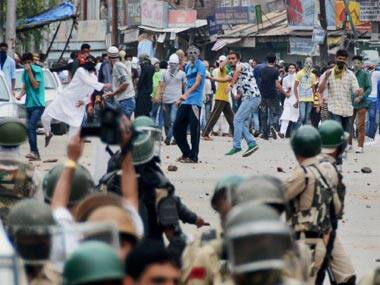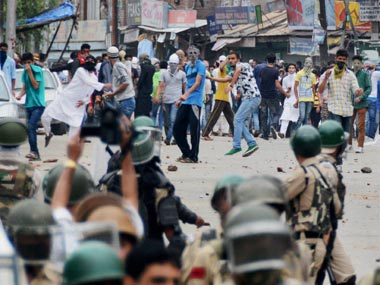New Delhi: The daring display of flags belonging to the dreaded terrorist outfit Islamic State (IS) in Kashmir, followed by tension that broke out after an IS flag was burnt reportedly by the Vishwa Hindu Parishad activists, raises a question — has the Islamic State (also known as ISIS) succeeded in penetrating the Indian soil? [caption id=“attachment_2349698” align=“alignleft” width=“380”]  Protesters throw stones on police during a clash after Jumat-ul-Vida , at Nowhatta in Srinagar on Friday. PTI[/caption] Defence analyst Alok Bansal said, “No doubt, it’s a major concern in terms of the country’s internal security. The IS jihadists have already announced a war in future from the soil of Khorasan that includes India. For the IS, their ultimate battle for global jihad will be on this land of Khorasan. They have also talked about Kashmir. The unfurling of IS flags will give a boost to the radicalisation in Kashmir valley, as more number of educated youth are joining militancy.” Khorasan is the name of a historic region that covers Afghanistan, Pakistan, parts of India and some of the surrounding countries. The IS announced that it has established a province in Khorasan. Even earlier, in October 2014, the IS flag was sighted in the Kashmir valley. “It’s a matter of serious concern for Indian intelligence and internal security. The unfurling of IS flags doesn’t mean that they have made penetration in India, but it’s going to have an impact on local militants in Kashmir, who have been trying to control the valley since long. Pakistan through the Hurriyat leaders has been successful in creating disturbances in the valley. The IS flag is symbolic for the youths who are attracted to the IS ideology of brutal extremism,” counter-terrorism analyst, Anil Kamboj said. Intelligence reports say that more than 100 youth from the Kashmir valley have reportedly joined militant outfits in the last five months. According to police sources, youths between 18 and 25 years have been joining the militant outfit – Hizb-ul-Mujahideen – and getting trained in handling weapons and explosives. Following the tension that erupted in the valley, after an IS flag was burnt, the National Security Advisor Ajit Doval visited Srinagar to take stock of the situation. According to sources, Doval met Jammu and Kashmir Governor, NN Vohra, Chief Minister Mufti Mohammad Sayeed and senior security and intelligence officials. “He has reviewed the internal security in Jammu and Kashmir, and meetings were held to chalk out strategies to combat this new challenge. Radicalisation of educated Kashmiri youth by the militant outfits is a matter of great concern. Till date, the uneducated and unemployed youth from economically weaker sections were soft targets, but now the educated youth, even from middle-class, are joining militant groups,” a source said. Former R&AW chief, CD Sahay, said, “It’s a matter of concern, but just by waving IS flags, the IS can’t set up its base in India. Efforts are on to radicalize Kashmiri youth and bring them into the fold of militancy. But, the ideology of the IS is alien to Kashmiris, and Indian Muslims won’t support extreme radicalism. The reason is that Islamiyat in India, unlike in other parts of the world has undergone an evolutionary process. If a few IS flags in Kashmir valley can motivate youth to join the IS, then the problem is with us. However, the present turbulence in Kashmir valley due to the separatists is a big challenge to intelligence and security, but it can’t pose threat to India’s sovereignty and existence as a nation.” The earlier governments failed to curb militancy in Jammu and Kashmir, but will the incumbent PDP-BJP government walk the same path? It was expected that with the change of government in Jammu and Kashmir, especially with the BJP joining hands with the PDP, things will improve. But, right from the day of oath-taking ceremony, the statements of the chief minister raised controversies. In protest, even the Kashmiri pundits staged demonstration and held rallies both in Jammu and Kashmir and Delhi. “I’m not privy to the developments at the political level between the PDP and the BJP in Jammu and Kashmir on the issue of separatists, but what I presume that the alliance has been trying to bring out a solution. The issue of radicalisation needs to be dealt with in a calibrated manner, as this has been badly affecting the Kashmiri youth and drawing them towards militancy,” said Bansal. The role of Pakistan in assisting the separatists is no longer a secret. With its growing bonhomie with China even in Pakistan-occupied-Kashmir, things have only gotten far more complicated. “PDP has a soft corner for the separatists, which has also caused embarrassment for the BJP. But, had BJP not been there, the PDP would have got a free hand. Whenever, the heads of these two states – India and Pakistan tried to initiate a peace talk, we’ve witnessed firing on our borders. Pakistan army will never endorse a peace process initiated by its political head with India. The army always wants to have an upper hand. And, they have been using the separatists to keep the fire alive in Kashmir either by unfurling Pakistani and IS flags or by creating chaos. It’s towing the lines of China, which is doing the same on border issue,” said Kamboj.
The earlier governments failed to curb militancy in Jammu and Kashmir, but will the incumbent PDP-BJP government walk the same path?
Advertisement
End of Article


)

)
)
)
)
)
)
)
)



